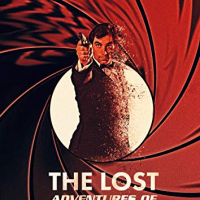Reporting For Duty
It looks like you're new here. If you want to get involved, click one of these buttons!
Quick Links
Categories
In this Discussion
James Bond After Fleming: The Continuation Novels
 ManyLives007
NYC
ManyLives007
NYC
Thought you might be interested in my new book about the continuation novels.
Ian Fleming wrote twelve original James Bond novels and two collections of short stories. Despite the cultural importance of Fleming’s 14 books, they represent just a fraction of the Bond novels. Since Fleming’s death, his estate has authorized the publication of numerous Bond novels and spin-off works.
These continuation novels include scores of books about Bond’s dangerous adventures, movie novelizations, a pseudo-biography, and various spin-off series about the teenage Bond, the Secret Service’s beloved secretary Miss Moneypenny, and the next generation agents in the Double O division.
For the first time ever, Mark Edlitz offers a comprehensive overview of every exciting Bond adventure in one illustrated volume. Whether you are fully immersed in Bond’s world or new to the spy game, James Bond After Fleming is an essential reference book that is a must-have for any Bond fan.
Happy to answer any questions.
Ian Fleming wrote twelve original James Bond novels and two collections of short stories. Despite the cultural importance of Fleming’s 14 books, they represent just a fraction of the Bond novels. Since Fleming’s death, his estate has authorized the publication of numerous Bond novels and spin-off works.
These continuation novels include scores of books about Bond’s dangerous adventures, movie novelizations, a pseudo-biography, and various spin-off series about the teenage Bond, the Secret Service’s beloved secretary Miss Moneypenny, and the next generation agents in the Double O division.
For the first time ever, Mark Edlitz offers a comprehensive overview of every exciting Bond adventure in one illustrated volume. Whether you are fully immersed in Bond’s world or new to the spy game, James Bond After Fleming is an essential reference book that is a must-have for any Bond fan.
Happy to answer any questions.
^ Back to Top
The MI6 Community is unofficial and in no way associated or linked with EON Productions, MGM, Sony Pictures, Activision or Ian Fleming Publications. Any views expressed on this website are of the individual members and do not necessarily reflect those of the Community owners. Any video or images displayed in topics on MI6 Community are embedded by users from third party sites and as such MI6 Community and its owners take no responsibility for this material.
James Bond News • James Bond Articles • James Bond Magazine
Comments
I did enjoy Colonel Sun, but missed the Fleming “flow”, and I quit Gardener’s books about halfway through his tenure.
John Pearson’s biography was outstanding, and I felt closest captured Fleming’s spirit…
So who, in your estimation, comes closest to the original creator, and why?
Amis was more or less writing when Fleming was, so he automatically captured the setting and time. His torture sequence brings to mind the carpet-beater scenes in CR.
Horowitz aims for the style and spirit of Fleming and would only write a book set within Fleming's canon/chronology.
Weinberg's Moneypenny Diaries feels like a proper Cold War thriller.
Benson wanted to retain Bond's character and insert him into movie-esque plots.
Wood's first novelization feels very Fleming.
Other writers take different elements. Higson wants to keep his novels fast and fun, while simultaneously drawing from elements.
I could go on (and do) but IFP doesn't want its authors to try to just imitate Fleming for any individual book. For starters, no one really can. But also, better books come from when the novelist feels like they can bring themselves to the work.
Thanks Mark! One of the things that irks me, and why I have been unsuccessful at reading the continuation authors consistently is that, apart from Pearson (especially), and Colonel Sun, the other authors have a character named James Bond, but…. He doesn’t feel like James Bond. That although writers may have different styles and strengths, I feel like I’m not identifying this character as James Bond, 007.
Is there an author you feel that captures the characterization of Fleming’s Bond? As if he walked straight from the pages of TMWTGG, and into this new adventure written by someone else??
I find that IFP wanted Faulks wanted to imitate Fleming for DMC. I can't wait for your book @ManyLives007 hopefully it will arrive this week. I enjoyed your other books, great for any collection!
Along those lines, a continuation author shouldn't knowingly tamper or contradict the existing facts in Fleming's work. They can add to them or reframe them, but never intentionally contradict.
And thank you very much for the kind words!
You're welcome! I'm happy that you took time to honor the Bond Continuation Novel authors. I think more people need to realize that we should be grateful for them. If we didn't get more books, we would be complaining. Being a James Bond writer for any form of media, is really a thankless job. I'm happy that Bond authors (along with various Bond alumni) have been friendly with me on social media.
And thoughts on Deaver's attempt (especially in comparison to Faulks, Horowitz and Boyd)? I kind of think that it's a good novel but a generic thriller rather than a Bond story.
https://spybrary.com/james-bond-after-fleming/
Hosted by Matt Raubenheimer and featuring Mark Edlitz, Bill Kanas (and me). :)